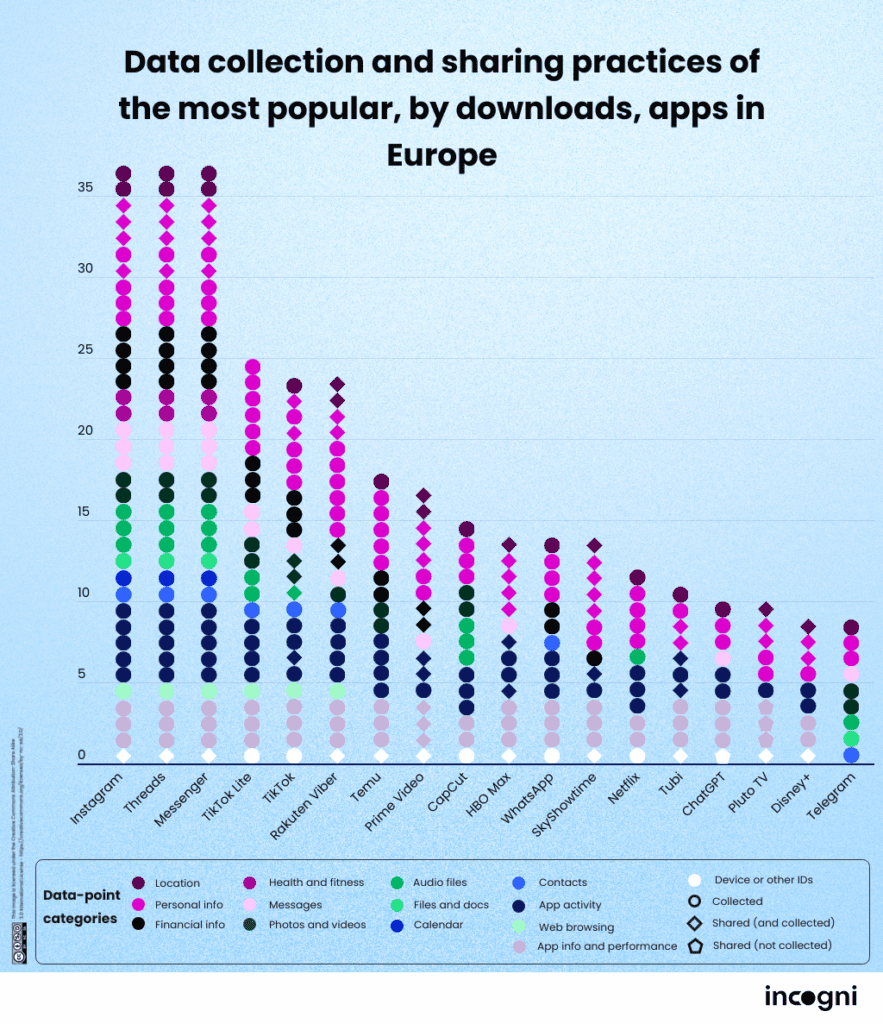Digital privacy company Incogni conducted research on American and Chinese platforms that harvest sensitive data from Europeans. Despite alleged digital protection laws, these apps can avoid them.
Blockchain technology could solve these problems, but the dominant power of the Internet is moving in the opposite direction. That would be a tough battle.
European digital privacy violations
Since the early days, the crypto community has had a strong interest in digital privacy. After all, Bitcoin was created to be unreliable, anonymous, and decentralized.
However, the Internet in 2025 is a very different location compared to 2009. The selected number of platforms control much of the traffic, and they are all harvesting data.
Despite Europe, which leads the Personal Data Protection Act, Incogni researchers have clarified the practices of foreign development applications and how data from European citizens are processed. Incogni Head Darius Belejevas told Beincrypto Darius Belejevas that applications developed by foreign companies can easily run in gray areas.
According to a new study published by Incogni, major platforms based in the US and China engage in systematic violations of digital privacy. Government frequently investigates American social media appsand it can be easily assumed that China is adopting a similar method.
Incogni’s research focuses on Europe, and the conclusions on app-based data collection are rather surprising. The continent has strict digital privacy laws on the surface, but these foreign platforms control vast amounts of data.
It’s easy to imagine how this problem will get worse in other regions.
Is blockchain useful?
So how can blockchain technology guarantee digital privacy? Web3 applications such as Self-Sovereign IDs (SSI), Distributed Identifiers (DIDS), and Tokenized Data Markets provide models for users to control and selectively disclose information via encrypted proofs, preventing bulk harvesting and boundary leaks.
Unlike centralized apps, blockchain systems continue to make verification locally transparent. By embracing the origins of Crypto as a radically decentralized system, it could potentially help citizens of the UK, the EU, or other countries protect their digital privacy.
However, this optimistic scenario seems highly unlikely. Cybersecurity experts are concerned about the trends in crypto fraud.
These platforms probably won’t allow a huge number of users to show off how they collect data. Privacy-focused enthusiasts may need to build parallel structures.
Can a blockchain-based platform actually replace messaging, entertainment, social media, and more? These exchanges require the recruitment of important users. Messages that can’t send messages to anyone, streaming apps that don’t have content will not be useful.
Government hurdles imposed
As recent US plans to post economic data on blockchains show, motivated governments can use this technology for powerful new use cases.
If this type of plan has actual buy-in from the EU government, privacy experts can force these platforms to allow blockchain-based user obfuscation techniques.
There’s only one question. Is the EU government interested in digital privacy? MICA regulations suggest that they are not, but other recent cases provide further evidence.
The Online Safety Act (OSA), an attempt to verify the UK’s digital age, has even proven to be a source of frightening human rights criticism.
The website must abandon its pretend to be digital privacy and verify the identities of all potential users before accessing the platform. The EU appears to be testing similar requirements.
In short, the general headwinds of the Internet do not support digital privacy. Committed developers can build Web3-based solutions, but that becomes a long and difficult battle. Still, blockchain technology is the best way to make this dream come true.
We and China are washing European personal data – is the blockchain modified? It first appeared in Beincrypto.


